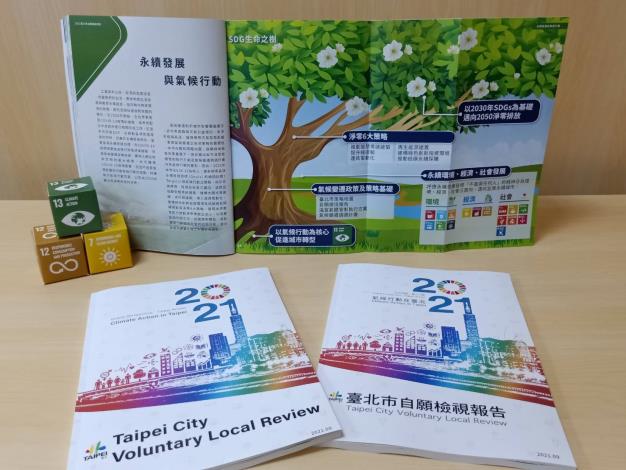Taipei City strives to promote sustainable development progress and continuously take part in global conversations. Invited by Urban Environmental Accords (UEA), today the City published its“2021 Taipei City Voluntary Local Review” (2021 Taipei City VLR) on the 2021 UEA Yeosu Summit held in South Korea. To align with the goal of net-zero emissions by 2050, the VLR focused on SDG 13 climate actions to showcase the City’s determination to promote carbon reduction and examined how various SDGs are correlated to its measures.
The Department of Environmental Protection (DEP) of Taipei City Government said that Taipei City joined the UEA in 2005, and that the UEA is an international collective of cities committed to pursue sustainable development with 156 members. Since 2011, biennial summits have been held by the UEA, allowing members to exchange progress and achievements in sustainable development. Apart from the UEA summit, the 2021 Taipei City VLR will be also showcased on open VLR platforms of IGES and UCLG, enabling the international community to better understand the long-term outcomes built on the City’s climate actions and sustainable development efforts.
The DEP said that the 2021 UEA Yeosu Summit focuses on “Sustainable Cities through Realizing Net-Zero”. Taipei City will share outcomes of promoting a sustainable city with member cities in countries like Korea, Philippiens, Cambodia, and Cameroon, etc. Divided into three aspects-environmental, economic, and social, the City’s sustainable efforts will be formulated as the basis and a viable pathway in gradually implementing the City’s net-zero emission goals. - Eco-friendly resilient city: the City has enacted the “Taipei City Clean Air Action Plan” since 2016, implementing the strategy of “low emission, green transportation, and regional cooperation”. In addition, the City has designated three transportation hubs and six tourist hotspots as “Air Quality Maintenance Zones”, the first of its kind among metropolitan areas in Taiwan. In addition, the City has proposed the three-year electric scooter subsidy scheme and is expected to establish a fleet of 3,500 electric municipal buses by 2030 to reduce air pollution as well as meeting WHO guidelines of PM2.5 of 10μg/m3. Furthermore, to reduce the urban heat island effect, Taipei City has proposed the “Taipei Street Trees 15-Year Vision Plan”. By planting trees and shrubbery to connect green spaces as well as strengthening street trees maintenance management, the City creates an urban green ecosystem and a clean, healthy environment for its citizens.
- Circular economy, prosperous Taipei: Focusing on circular economy, Taipei City has launched the “Subsidies & Incentives for Taipei Industry” to facilitate the upgrade and transformation of small and medium-sized enterprises; moreover, the City has developed industrial exchange platforms and set out plans for startup labs to boost the City’s capacity for innovation in circular economy. Apart from this, Taipei City actively seeks to expand civic participation in the development and use of renewable energy. By launching the “Solar Taipei Program”, the City promotes the set up of solar PV systems throuth public-private partnership. In 2020, the City collaborated with the citizen interest group Homemakers United Foundation to build Taiwan's largest civic power plant with a capacity of 19.8 kW at Guandu Junior High School. Taipei City has also set a target of solar PV installation to reach 66MW by 2030. In addition, the City introduces smart micro power grid systems that integrate solar PV and energy storage equipment in social housing, campuses and government agencies, to increase renewable energy use and build the foundation for energy transition.
- Friendly, Inclusive and Shared Society: In response to the threat posed by short-duration intense rainfall due to extreme weather, Taipei City has established the “Taipei City Disaster Prevention Info Website” and the “Taipei City Disaster Prevention App” to provide the latest disaster prevention information for citizens, enhancing capabilities for disaster prevention and recovery. Moreover, to improve disaster prevention community education and the concept of self-driven disaster prevention communities, the City has coordinated disaster relief volunteer training and certification scheme. As of the end of 2020, a total of 1,840 citizens had become certified disaster relief volunteers, helping with neighborhood response measures and reducing property damage. Besides, to effectively distribute and utilize leftover food, the City has established a food exchange platform, joining hands with seven public-owned markets and the Taipei Agricultural Products Marketing Corporation; meanwhile, Taipei City has not only established local community care centers to provide “shared meals for seniors”, but promoted food education and raise awareness of cherishing food. With these measures in place, the City ensures stable and sufficient food supply for disadvantaged groups.
The DEP pointed out that during the UEA summit, experts and scholars, NGOs and youth climate action activists from more than 13 countries will share implementation plans to net-zero emissions or practices in creating sustainable cities. The DEP also indicated that Taipei City is undertaking the assessment of pathway planning in achieving net-zero emissions by 2050. The City will continue to advance, adopt experiences of international cities, and accelerate urban transformation.


![Taiwan.gov.tw [ open a new window]](/images/egov.png)
